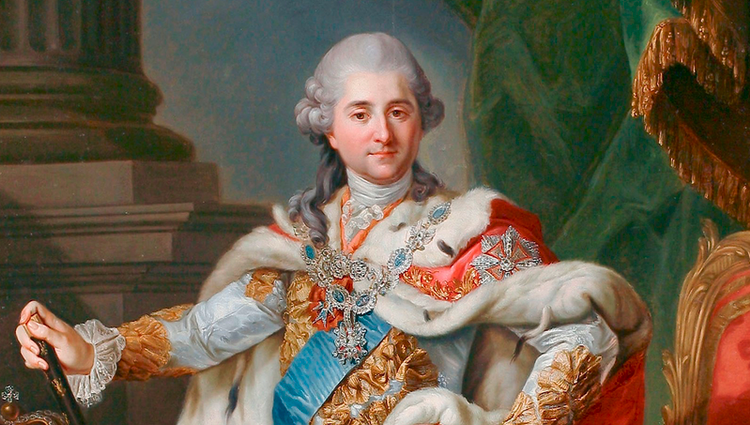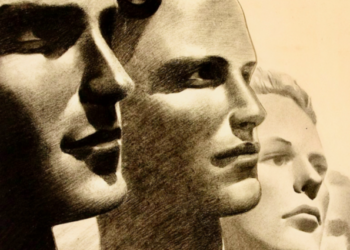Poland’s reforms and constitution, Edmund Burke thought, offered real meaning, much closer to the experience of the American Revolution than that of the French Revolution. In significant ways, the Polish king succeeded because he embraced the laws of nature and “the array of Justice” without forcing anything of his own will upon his people.
 Stanislaw Augustus (1732-1798) was the last Polish king. Not without controversy, he was one of the greatest patrons of the arts and sciences in his day. In his many efforts, he supported publishing, libraries, architecture, education, painting, cartography, ballet, theater, and industry. He was also the co-author of the Polish constitution of May 3, 1791. A great and meaningful reformer, the last monarch essentially undid his own position.
Stanislaw Augustus (1732-1798) was the last Polish king. Not without controversy, he was one of the greatest patrons of the arts and sciences in his day. In his many efforts, he supported publishing, libraries, architecture, education, painting, cartography, ballet, theater, and industry. He was also the co-author of the Polish constitution of May 3, 1791. A great and meaningful reformer, the last monarch essentially undid his own position.
In An Appeal from the Old Whigs to the New, the grand Anglo-Irish statesman, Edmund Burke, praised the May 3, 1791 constitution as one of the great reforms of the modern world. It should be remembered that this was the so-called “Age of Revolutions,” and Burke had witnessed both the glories of the American Revolution and the hideousness of the French Revolution. Poland’s reforms and constitution, he thought, offered real meaning, much closer to the American experience than the French one.
No confusion could be feared in such an enterprize; because the establishment to be reformed was itself a state of confusion. A king without authority; nobles without union or subordination; a people without arts, industry, commerce, or liberty; no order within; no defence without; no effective publick force, but a foreign force, which entered a naked country at will, and disposed of everything at pleasure. Here was a state of things which seemed to invite and might perhaps justify bold enterprize and desperate experiment. But in what manner was this chaos brought into order? The means were as striking to the imagination, as satisfactory to the reason, and soothing to the moral sentiments. In contemplating that change, humanity has every thing to rejoice and to glory in; nothing to be ashamed of, nothing to suffer. So far as it has gone, it probably is the most pure and defecated public good which ever has been conferred on mankind. We have seen anarchy and servitude at once removed; a throne strengthened for the protection of the people, without trenching on their liberties; all foreign cabal banished, by changing the crown from elective to hereditary; and what was a matter of pleasing wonder, we have seen a reigning king, from an heroic love to his country, exerting himself with all the toil, the dexterity, the management, the intrigue, in favour of a family of strangers, with which ambitious men labour for the aggrandizement of their own. Ten millions of [186] men in a way of being freed gradually, and therefore safely to themselves and the state, not from civil or political chains, which, bad as they are, only fetter the mind, but from substantial personal bondage. Inhabitants of cities, before without privileges, placed in the consideration which belongs to that improved and connecting situation of social life. One of the most proud, numerous, and fierce bodies of nobility and gentry ever known in the world, arranged only in the foremost rank of free and generous citizens. Not one man incurred loss, or suffered degradation. All, from the king to the day-labourer, were improved in their condition. Every thing was kept in its place and order; but in that place and order every thing was bettered. To add to this happy wonder (this unheard-of conjunction of wisdom and fortune) not one drop of blood was spilled; no treachery; no outrage; no system of slander more cruel than the sword; no studied insults on religion, morals, or manners; no spoil; no confiscation; no citizen beggared; none imprisoned; none exiled: the whole was effected with a policy, a discretion, an unanimity and secrecy, such as have never been before known on any occasion; but such wonderful conduct was reserved for this glorious conspiracy in favour of the true and genuine rights and interests of men. Happy people, if they know to proceed as they have begun! Happy prince, worthy to begin with splendor, or to close with glory, a race of patriots and of kings…
Yet, Burke complained, all of the intellectuals focused on the French, ignoring the good successes of Poland.
Burke’s argument in favor of the May 3, 1791 constitution energized the King of Poland who, to Burke’s surprise, bequeathed upon him a gold medallion of thanks and praise. On one side stood the king; on the other, his high words for Burke. The regal gift was given to the Polish Ambassador to England, who then gave it to Burke.
On February 28, 1792, Burke thanked the king in a long and formal letter. He recognized Stanislaw Augustus not only for leavening him with his words but also for leavening all men. “It is a poor exaltation which consists only in the depression of other men. I love Nobility. I should be ashamed to say so, if I did not know what it is that I love. He alone is noble, that is so reputed by those, who, by being free, are capable of forming an opinion. Such a people are alone competent to bestow a due Estimation upon Rank and Titles.” In significant ways, Burke continued, the Polish king succeeded because he simply and merely embraced the laws of nature and “the array of Justice” without forcing anything of his own will upon his people.
The two men continued to correspond, but in early 1793 Russia and Prussia invaded Poland, forcing the king and his people to give up their sovereignty and ultimately the monarchy. “In the midst, of my most smarting sorrow, I find no other Consolation but the witness of my Conscience, and the testimony of virtuous and enlightened Man, like You Sir, that I sought nothing but the good of the Nation, and was not willing to wrong any body; and that if I am unhappy, it is only because, such is the will, of the Allmighty Dispenser of our Destiny.” Whatever his own personal troubles, the king continued to praise Burke, requesting of him a collection of his works. “May Your Country enjoy long yet Your talents, and Your sound Patriotism,” he wrote.
This essay was first published here in July 2020.
The Imaginative Conservative applies the principle of appreciation to the discussion of culture and politics—we approach dialogue with magnanimity rather than with mere civility. Will you help us remain a refreshing oasis in the increasingly contentious arena of modern discourse? Please consider donating now.
The featured image is a portrait of Stanislaus Augustus Poniatowski in coronation robes (1764) by Marcello Bacciarelli (1731–1818) and is in the public domain. It has been brightened for clarity and appears here, courtesy of Wikimedia Commons.











